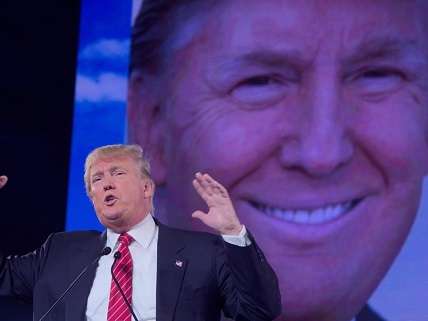Donald Trump's Putrid Embrace of Eminent Domain Abuse
Another day, another shameful defense of eminent domain abuse by Trump.

At a press stop in New Hampshire, Republican presidential hopeful Donald Trump took a question about eminent domain from Washington Examiner reporter Philip Klein. Trump's answer was as putrid as you might expect:
"Property rights are a big issue in New Hampshire," the Examiner noted. "In Atlantic City you used eminent domain laws aggressively to expand your casino."
Trump interjected by calling this a "stupid question" before launching into a defense of eminent domain.
"I am all for private property rights," Trump said. "There's nobody who wants property taken away less than I do, believe me. I would lose a lot of money if my property were taken away. But when you're building a road, when you're building a highway, when you're building whatever it is you're building from a municipal standpoint, you may need a corner of a piece of property." As he said this, he pinched his fingers together to demonstrate the smallness of the property.
What garbage. In Kelo, the famous Supreme Court eminent domain ruling which Trump has repeatedly praised, the government's land grab wiped out an entire neighborhood, not "a corner of a piece of property." Similarly, when New York officials wielded eminent domain in order to clear space for the Barclay's Center basketball arena in Brooklyn, the government's bulldozers laid waste to multiple homes and businesses. An entire city block was erased from the map. The examples of this sort of eminent domain abuse go on and on.
Indeed, Trump's own eminent domain abuse follows the same ugly pattern. For instance, when he joined forces with New Jersey officials in 1994 in the hopes of using eminent domain to build a new limousine parking lot for the Trump Plaza hotel and casino, Trump and his government pals did not merely seek to take "a corner of a piece of property;" they sought to raze the entire home of an elderly widow named Vera Coking. That blatant land grab was thankfully laughed out of court.
To be sure, the U.S. Constitution does permit the use of eminent domain in certain very limited circumstances, such as the building of genuine "public uses" such as roads or bridges. But that limited constitutional approach is not what Donald Trump has embraced. Trump's brand of eminent domain would grant government officials (and their crony capitalist allies like him) what amounts to a blank check to take whatever private property they claim to "need." Trump's vision of untrammeled government power is an affront to the very idea of constitutionally limited government.


Show Comments (69)